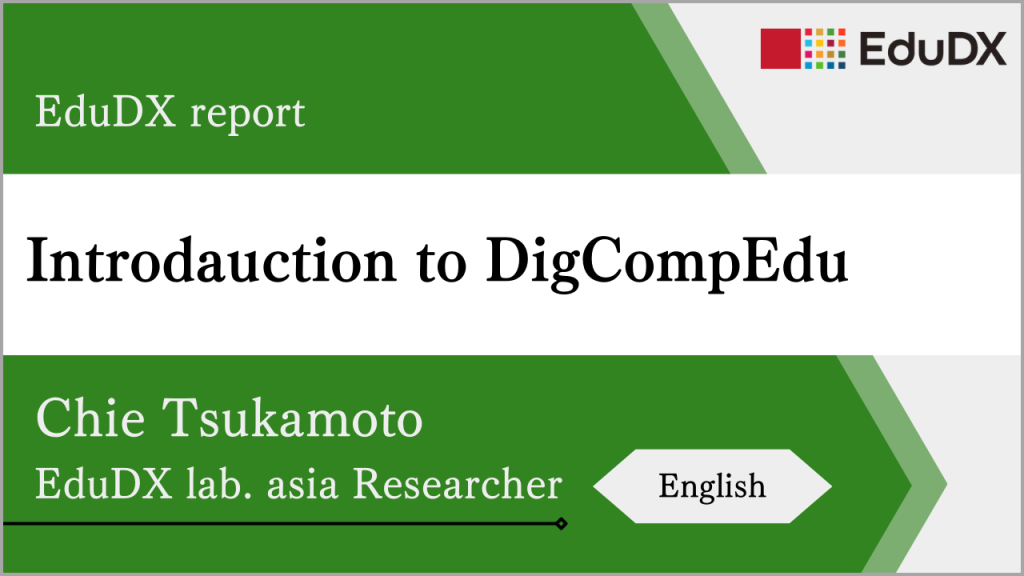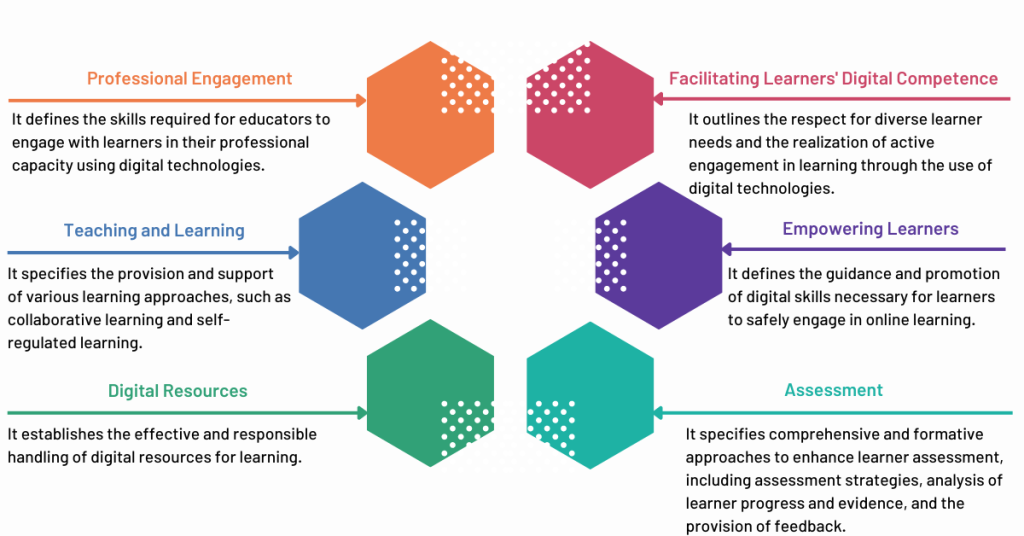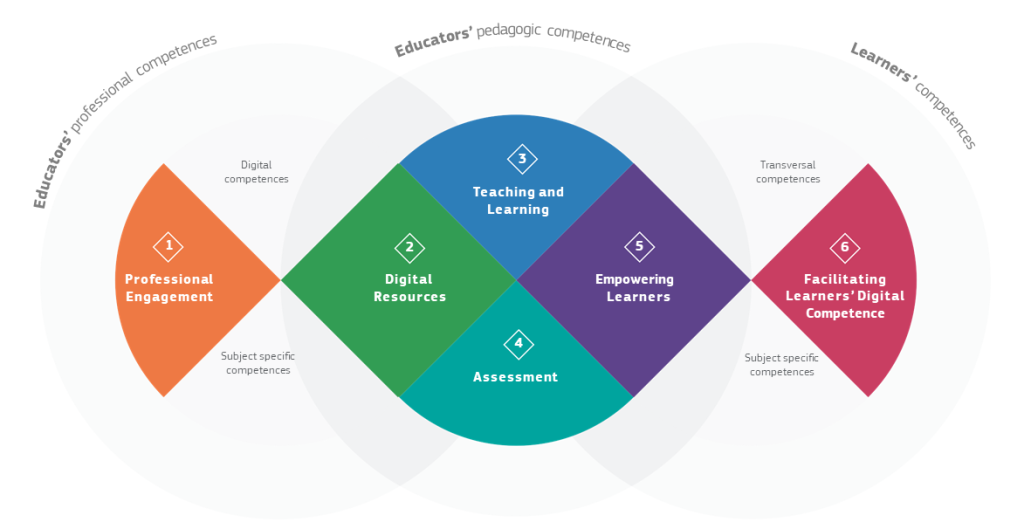Introduction to DigCompEdu

17 July 2024 Chie Tsukamoto (Researcher of EduDX lab.Asia)
The COVID-19 pandemic that began in 2020 posed unprecedented challenges for the education sector.
“We can’t conduct classes in the classroom. What should we do…?”
In Japan, where the learning style of attending school and taking classes in person is deeply ingrained, the situation of not being able to attend school was unexpected. Many teachers were likely at a loss when suddenly required to respond to this crisis. This urgency brought online classes and ICT education to the forefront.
The Japanese government had been promoting ICT education even before the pandemic. Some might have heard of the GIGA School Program (i), which involves providing each student with a tablet device and improving internet infrastructure within schools. For the government, the pandemic was the perfect opportunity to push for ICT education.
However, it’s important to note that the government’s efforts primarily focused on providing the necessary tools for ICT education. Without support for the people using these tools, they might just gather dust. The education sector, already overwhelmed, couldn’t be expected to adapt quickly to the new tools just handed to them without proper guidance.
Japan is said to lag significantly behind other developed countries in ICT education (ii). There are numerous reasons, including chronic staff shortages and the harsh environment of the educational field. Despite these challenges, the ICT education environment set up by the government should serve as a beacon of hope for teachers dedicated to delivering education to children even in such tough conditions.
DigCompEdu, the Digital Competence Framework for Educators, offers insights into how to engage with and utilize these tools effectively.
Digital competence
Before introducing DigCompEdu, let’s briefly touch on digital competence. Digital competence is one of the key competencies for lifelong learning proposed by the EU (European Union) in 2006 (iii). It defines the ability to use ICT effectively in various contexts such as learning, work, and everyday life.
While this definition might sound complex, it essentially refers to basic skills like searching for and sharing information on the internet and communicating online. In other words, it’s about defining the everyday actions we perform unconsciously.
Since its proposal in 2006, various frameworks have been established to promote digital competence. In 2013, the DigComp (iv) framework for developing citizens’ digital skills was introduced, followed by DigCompOrg (v) for educational organizations to promote the proper use of digital learning technologies. In 2017, DigCompEdu (vi), a framework specifically for educators, was introduced, building on these foundations.
Educators face the rapidly changing ICT environment head-on. Digital devices and apps have become widely accessible, and students can easily use them. Therefore, there’s a growing need for educational support to help students develop appropriate digital skills. Educators themselves need a broad knowledge and refined skills in digital technology.
DigCompEdu defines digital competence for educators, aiming to help them develop, self-assess, and improve their digital skills.
It targets educators at all levels, including early childhood, higher education, adult education, general and vocational training, special education, and informal learning environments. DigCompEdu focuses not on technical skills but on how educators can effectively and innovatively use digital technology in teaching, training, and support.
Defining and Organizing DigCompEdu Competences
DigCompEdu breaks down the necessary competencies for educators into 22 specific skills. These are not technical skills but focus on how digital technology can enhance and innovate education and training.
The framework uses past research on defining digital competence and digital-capable organizations (DigCompOrg).

Source: https://joint-research-centre.ec.europa.eu/digcompedu/digcompedu-framework_en
The Six Areas
In addition to the general digital skills needed by everyone, educators require specific digital skills applicable to their roles to adapt to the new era. DigCompEdu organizes the 22 competencies into six areas to make them more manageable:

The Three Categories
DigCompEdu categorizes the necessary digital competences for educators into three categories:
1. Learners’ Competences: Defines the competences needed for educators to guide students towards effective and safe learning online, fitting into the “Facilitating Learners’ Digital Competence” area.
2. Educators’ Professional Competences: Defines the competences needed for educators to effectively practice digital transformation in education, fitting into the “Professional Engagement” area.
3. Educators’ Pedagogic Competences: Defines the competences needed to appropriately use digital tools in education and learning to enhance the learning experience of students, covering the areas of “Teaching and Learning,” “Digital Resources,” “Empowering Learners,” and “Assessment.”

Source: https://joint-research-centre.ec.europa.eu/digcompedu_en
Summary
When searching for information on ICT, you’ll find plenty of support and measures for infrastructure development, system utilization, paperless operations, online materials, and support staff. However, information from the perspective of engagement with digital technology is rare. Approaching ICT from this angle might feel fresh to some.
Digital technology increasingly influences daily life, transforming society and the economy. Individual approaches to digital technology can vary greatly, leading to disparities and inequalities. Thus, providing equal learning opportunities to develop and enhance digital competence for everyone is essential.
Understanding the digital competences required of educators through DigCompEdu and considering new learning methods using digital technology can be a step toward not just solving immediate problems like promoting ICT and reforming the educational field but also developing and evolving teaching methods suited to the new era.
References:
(ⅰ) Realization of the GIGA School Concept
https://www.mext.go.jp/a_menu/other/index_00001.htm
(ⅱ) According to the OECD’s Programme for International Student Assessment (PISA) “2018 Survey Supplementary Materials (Use of ICT by Students in and out of School)”, Japan ranks lowest among OECD member countries in terms of ICT utilization in education.
https://www.nier.go.jp/kokusai/pisa/
(ⅲ) Recommendation of the European Parliament and of the Council of 18 December 2006 on key competences for lifelong learning.
https://eur-lex.europa.eu/legal-content/EN/TXT/?uri=celex:32006H0962
(ⅳ) DIGCOMP: A Framework for Developing and Understanding Digital Competence in Europe.
https://publications.jrc.ec.europa.eu/repository/handle/JRC83167
(ⅴ) DigCompOrg Framework
https://joint-research-centre.ec.europa.eu/european-framework-digitally-competent-educational-organisations-digcomporg/digcomporg-framework_en
(ⅵ) Digital Competence Framework for Educators (DigCompEdu)
https://joint-research-centre.ec.europa.eu/digcompedu_en
